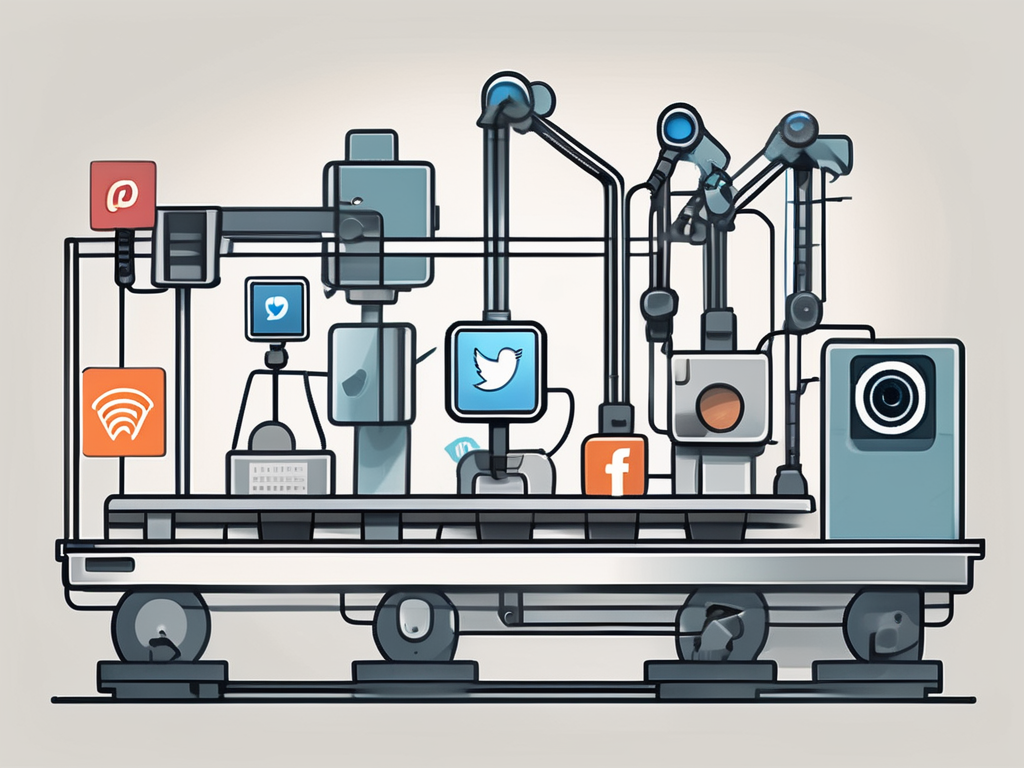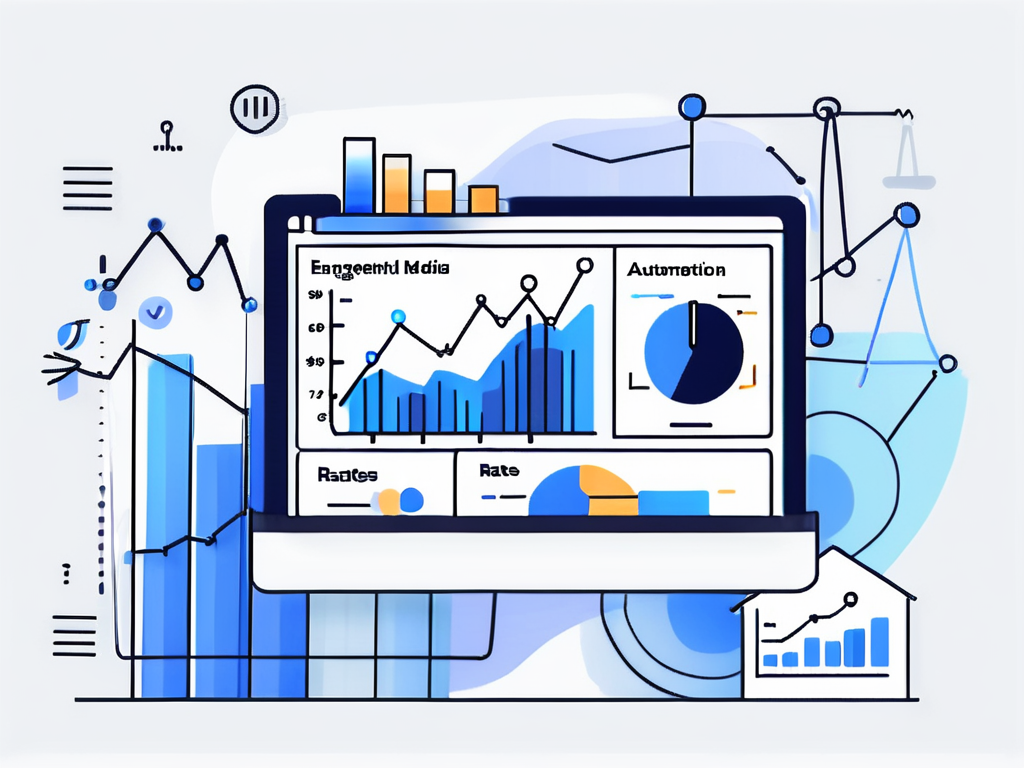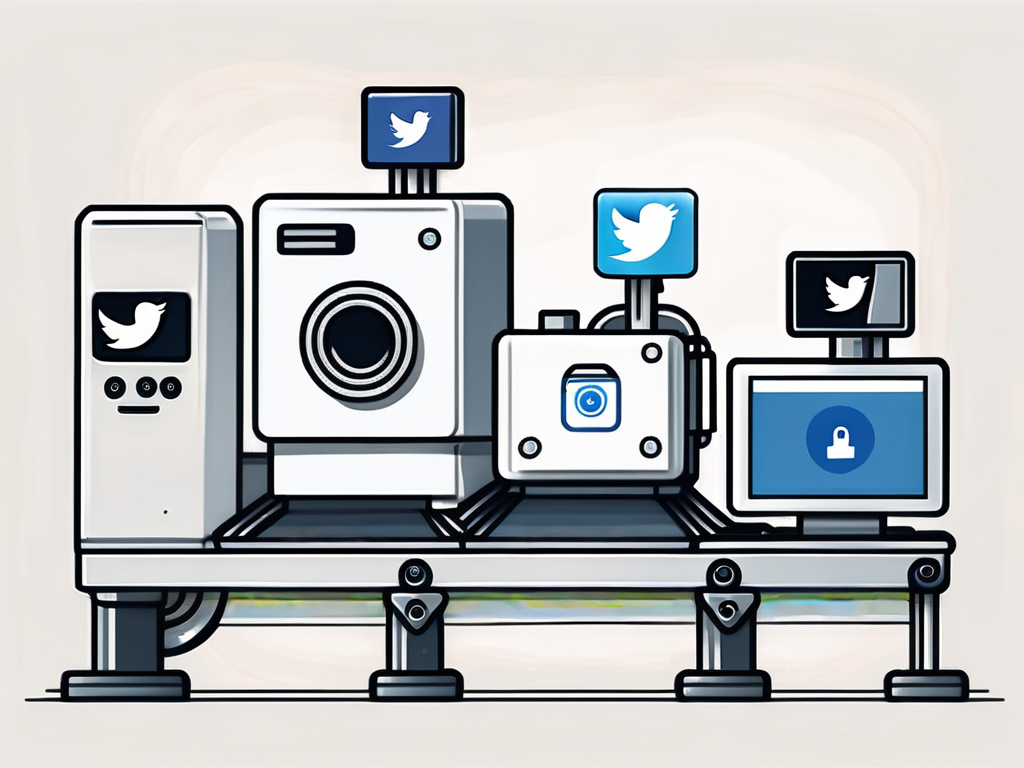
How to Automate Social Media Posts in Marketing
Social media marketing has become an integral part of any successful digital marketing strategy. It allows businesses to reach and engage with a wider audience, build brand awareness, and increase website traffic. However, managing multiple social media platforms can be a time-consuming task. This is where automation comes in. By automating social media posts, businesses can streamline their marketing efforts and focus on other important tasks. In this article, we will explore the importance of automation in social media marketing, how to choose the right automation tools, setting up your social media automation, best practices for automating social media posts, and measuring the success of your automation strategy.
Understanding the Importance of Automation in Social Media Marketing
Automation plays a crucial role in efficient marketing. It allows businesses to schedule and publish posts in advance, saving valuable time and effort. With automation, you can plan and create your social media content in batches, ensuring consistent messaging across all platforms. Additionally, automation tools provide valuable data and analytics, allowing businesses to track the performance of their social media campaigns and make data-driven decisions.
The Role of Automation in Efficient Marketing
Automation helps streamline the marketing process by eliminating repetitive tasks. It allows for efficient management of multiple social media platforms, ensuring that posts are published at optimal times. By automating social media posts, businesses can maintain a consistent online presence, even during periods when team members are unavailable.
Benefits of Automating Social Media Posts
There are numerous benefits to automating social media posts. Firstly, it saves time and resources. By scheduling posts in advance, businesses can focus on other important tasks without compromising their online presence. Automation also helps businesses stay organized and maintain a consistent brand identity. By planning and scheduling posts in advance, businesses can ensure that their messaging and visuals are aligned across all platforms. Lastly, automation allows for better targeting and engagement. By analyzing data and insights provided by automation tools, businesses can understand their audience better and tailor their content accordingly.
Choosing the Right Social Media Automation Tools
When it comes to choosing social media automation tools, it’s essential to consider your business’s specific needs and requirements. Here are key features to look for in automation tools:

Key Features to Look for in Automation Tools
- Integration with Multiple Platforms: Look for tools that support a wide range of social media platforms, such as Facebook, Twitter, Instagram, and LinkedIn.
- Scheduling and Publishing: Ensure that the tool offers advanced scheduling options, allowing you to set specific dates and times for your posts to be published.
- Analytics and Reporting: Choose a tool that provides detailed analytics and reporting, giving you insights into the performance of your posts and campaigns.
- Content Library: Look for tools that allow you to create and store a library of pre-approved content, making it easier to plan and publish posts.
- Engagement and Interaction: Consider tools that enable you to monitor and respond to comments and messages across different platforms.
Comparing Popular Social Media Automation Tools
There are several popular social media automation tools available, each with its own unique features and capabilities. Here are a few tools worth considering:
- Sprout Social: This tool offers an all-in-one platform for social media management, including scheduling, publishing, analytics, and team collaboration.
- Hootsuite: Hootsuite is known for its user-friendly interface and robust scheduling features. It supports a wide range of social media platforms and provides detailed analytics.
- Buffer: Buffer is a popular choice for small businesses and entrepreneurs. It offers easy-to-use scheduling and publishing features, as well as basic analytics and reporting.
- SocialPilot: SocialPilot is a cost-effective solution that offers scheduling, publishing, and analytics features. It also supports team collaboration and client management.
Setting Up Your Social Media Automation
Before diving into social media automation, it’s crucial to define your social media marketing goals and plan your content calendar.
Defining Your Social Media Marketing Goals
Identify what you want to achieve with your social media marketing efforts. Whether it’s increasing brand awareness, driving website traffic, or generating leads, your goals should align with your overall marketing objectives. By setting clear and measurable goals, you can better track the success of your automation strategy.
Planning Your Social Media Content Calendar
Create a content calendar that outlines your social media posts for the upcoming weeks or months. Consider important dates, events, and holidays that are relevant to your target audience. Your content calendar should have a good mix of promotional and informative content, keeping your audience engaged and interested.
Best Practices for Automating Social Media Posts
While automation can be a powerful tool in your marketing arsenal, it’s essential to follow best practices to ensure its effectiveness.
Timing and Frequency of Automated Posts
Timing is crucial in social media marketing. It’s important to post when your target audience is most active, ensuring maximum reach and engagement. Use data and insights provided by your automation tools to determine the optimal posting times for each platform. Additionally, be mindful of the frequency of your automated posts. Avoid bombarding your audience with excessive content, as this may lead to fatigue and decreased engagement.
Maintaining Engagement and Authenticity with Automation
While automation can save time and effort, it’s crucial not to lose the human touch in your social media interactions. Monitor and respond to comments, messages, and mentions promptly. Show genuine interest in your audience and provide valuable and relevant content. Remember, the goal of automation is to enhance your marketing efforts, not replace personal connections.
Measuring the Success of Your Social Media Automation
To ensure the effectiveness of your social media automation strategy, it’s essential to track and analyze key metrics.

Key Metrics to Track in Social Media Automation
Some key metrics to consider include reach, engagement, clicks, conversions, and follower growth. Use the analytics and reporting features of your chosen automation tools to monitor these metrics and gain insights into the performance of your posts. Regularly evaluate and adjust your strategy based on the data to optimize your social media marketing efforts.
Adjusting Your Automation Strategy Based on Analytics
Analytics provide valuable insights into the effectiveness of your automation strategy. If certain posts or campaigns are not performing well, consider making adjustments. Experiment with different types of content, posting times, and engagement tactics. By leveraging analytics data, you can continuously improve and refine your social media automation strategy.
Frequently Asked Questions (FAQs)
1. Can I completely automate all my social media posts?
No, it’s not recommended to completely automate all your social media posts. While automation can save time and effort, it’s important to maintain a human touch in your interactions. Engage with your audience, respond to comments, and stay updated with the latest trends and news in your industry.
2. How often should I post on social media?
The frequency of your posts depends on your audience and the social media platform you are using. Generally, it’s recommended to post on Facebook once or twice a day, on Twitter three to five times a day, on Instagram once or twice a day, and on LinkedIn once a day.
3. How can social media automation improve my engagement?
Social media automation can improve engagement by allowing you to schedule posts at optimal times when your audience is most active. It also provides insights into your audience’s preferences and behavior, enabling you to tailor your content for better engagement. Additionally, automation tools often offer features for monitoring and responding to comments and messages, ensuring prompt and personalized interactions.
4. Is it necessary to use different platforms for social media automation?
No, it’s not necessary to use different platforms for social media automation. Many automation tools offer integrations with multiple social media platforms, allowing you to manage and schedule posts from a single dashboard. This ensures consistency across platforms and simplifies the management of your social media marketing efforts.
5. How can I measure the return on investment (ROI) of my social media automation?
To measure the ROI of your social media automation, you can track various metrics such as website traffic, conversions, leads generated, and customer acquisition cost. By comparing these metrics with your business objectives and the resources invested in automation, you can determine the effectiveness and value of your social media automation strategy.
Conclusion
In today’s digital landscape, social media automation is a valuable tool for businesses looking to efficiently manage their social media marketing efforts. By understanding the importance of automation, choosing the right tools, setting goals, and following best practices, businesses can optimize their social media presence, engage with their audience, and drive meaningful results. Remember, while automation can save time, it’s crucial to maintain the human touch and authenticity in your interactions. Continuously measure and adjust your automation strategy based on analytics to ensure its effectiveness and maximize your social media marketing ROI.

Ready to harness the power of data-driven digital performance in your social media marketing? JP, led by Jonathan Prescott, a seasoned Chief Digital Officer, offers expert “Interim CDO for Hire” services to elevate your digital strategy. With a quarter-century of experience, JP specializes in crafting digital-first, customer-centric approaches that resonate with your audience. Don’t let the complexities of digital transformation hold you back. Contact us today to learn how we can help you automate your social media with precision and drive impactful results.
